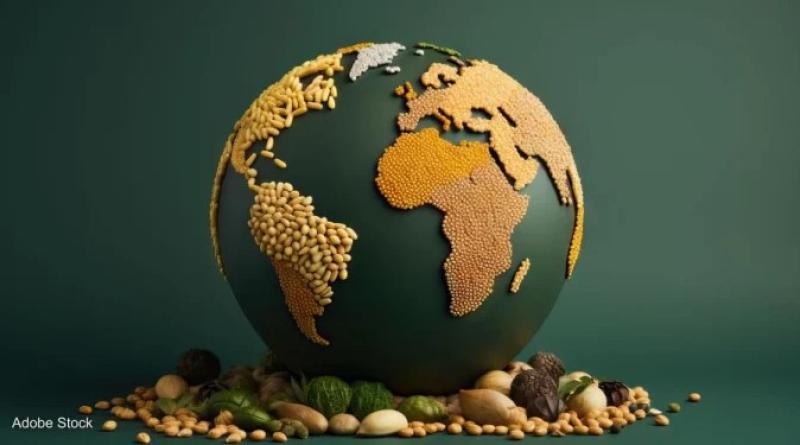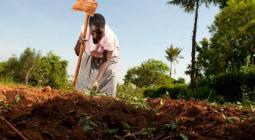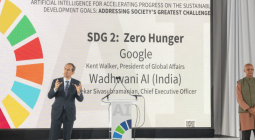Agricultural innovations are key to climate action

Agriculture has historically been a major contributor to global warming — but it can also play a major role in solving the climate crisis. Emily Rees, the president and CEO of CropLife International, explains how agricultural innovation can help.
The recently published United Nations report The State of Food Security and Nutrition in the World 2023 delivers delegates of the 28th U.N. Climate Change Conference, or COP 28, a stark and urgent warning about the effects of the worsening climate crisis.
Climate change has significantly disrupted global agricultural production and food systems — and, without rapid measures, this will only get worse. According to the U.N. report, in 2022, between 691 and 783 million people suffered from hunger and an estimated 2.4 billion people were moderately or severely food insecure, meaning they did not have access to adequate food.
Responding to the U.N. report in advance of COP 28, United Arab Emirates’ Minister of Climate Change and Environment Mariam bint Mohammed Almheiri emphasized the urgent need “to make nutritious food more accessible, affordable … and sustainable.”
But it is not just the immediate hunger crisis that our global food systems must address. Climate change is threatening regions of the world that cultivate essential crops such as rice, maize, and wheat. Climate patterns including El Niño, which began in July, are expected to further disrupt agricultural production due to abnormal floods in some regions coupled with unpredicted droughts in others.
COP 28: It’s time for action
The world is gathering in Dubai at a critical moment for global transformative climate action. COP 28 president-designate Sultan bin Ahmed al-Jaber has called on the Group of 20 leading economies to make the transformation of food systems a top priority. “National adaptation plans and strategies should promote sustainable land use, leverage technologies to increase crop resilience, enhance nutrition, and reduce the climate impacts of farming,” he said.
“Addressing food security and climate change cannot be tackled in isolation from one another.”
—
And as the global advocate for the research and development sector of plant science, CropLife International could not agree more. We champion the innovative agricultural technologies that enable farmers to sustainably increase productivity while managing the critical challenges facing our climate and the environment. Agricultural innovation coupled with new farming methods can play a major role in solving the climate crisis, while simultaneously providing sufficient food for an increasing global population projected to reach 9.7 billion by 2050.
To do this, agriculture must transform rapidly into a sustainable, climate-resilient sector — one that is significantly more productive — by accelerating the adoption of regenerative agriculture systems that increase productivity; reduce carbon emissions; favor adaptation; preserve and restore land resources by enriching soil health; fostering biodiversity; and optimizing water retention. And it can do so while helping countries meet their Paris Agreement commitment to reduce emissions.
Plant science technologies offer proven solutions to tackle climate change
Innovations in digital and precision agriculture, genetically modified and genome-edited crops, as well as novel crop protection solutions coupled with integrated pest management, allow more food to be produced using less land and with less environmental impact. The resulting higher crop yields, as well as more nutritious and resilient crop strains, will alleviate the need for any further agricultural land expansion.
Examples of plant science innovations include the development in Kenya of a genetically modified cassava resistant to cassava brown streak disease — a damaging virus causing brown streaks along the stem of the plant and necrosis of the roots — which promises to be a game-changer for food security in the country. Another example is a new drought-tolerant variety of durum wheat, a crop that is widely eaten across North Africa and the Middle East, developed by an international group of farmers and crop scientists. The new plant variety was created by crossing commercial durum wheat with a wild relative from an arid region of Syria.
Agricultural practices, such as the shift to zero tillage land management, take carbon from the atmosphere and allow it to be stored in the soil. Reduced tillage practices have also reduced soil erosion and enhanced moisture conservation, enabling increased carbon sequestration during drought years. Innovations such as genome editing have the potential to revolutionize agriculture even further, creating crops resilient to climate extremes, resistant to pests and diseases, and capable of storing even more carbon.
Working together to achieve shared climate goals
Coupled with the right investment, agricultural innovation that uses the principles and practices of regenerative agriculture can convert degraded agricultural land back into productive and sustainable arable farmland. Brazil, for example, has approximately 40 million hectares of degraded pastureland, an area larger than Germany. Between 2000 and 2021, Brazil recovered almost 21 million hectares, which also includes significant reforestation efforts.
Addressing food security and climate change cannot be tackled in isolation from one another. Sustainable agricultural innovation can only take place if it is supported by policy environments that encourage plant science innovation and commercialization, as well as predictable and science-based international trading standards that facilitate the movement of food and innovations around the world. Unpredictable climate shocks can turn a country from a net exporter to a net importer almost overnight; global trade must therefore be both open and agile to ensure food security for all.
Open, transparent, and inclusive global trading standards are essential for food to circulate from where it is produced to where it is needed in the light of climate shocks that may challenge local production. Regulatory inconsistencies and misaligned trade policies can also have long-lasting impacts, preventing agricultural innovations from reaching farmers.
CropLife International is delighted to have the opportunity to be part of the discussions around food and agriculture at COP 28 in Dubai, including innovation investment, regenerative agriculture, and national transformation pathways.
The latest U.N. report on the state of food security highlights the global emergency only too graphically. We therefore urge COP 28 delegates to agree on swift and comprehensive action to enable climate mitigation and adaptation measures around the world. Agricultural innovation and sustainable agricultural systems will be a critical component of this effort. It is time for governments, businesses, and international organizations to come together in pursuit of these shared goals, for the sake of the planet and its people.
For more information about CropLife International and how our members’ innovations contribute to climate and food security solutions, please go to our website at croplife.org.






